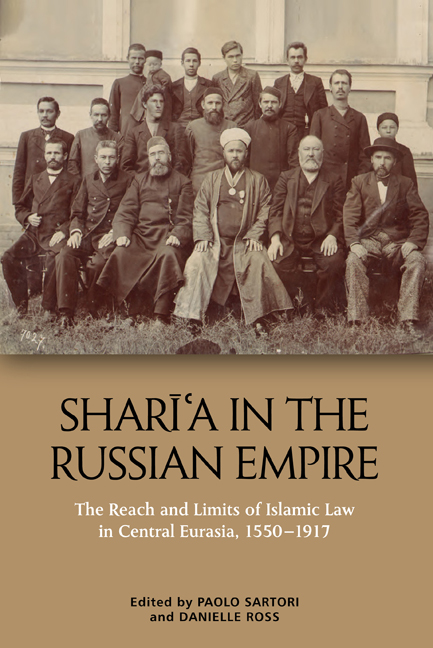Book contents
- Frontmatter
- Contents
- List of Contributors
- Introduction: The Reach and Limits of Sharīʿa in the Russian Empire, c.1552–1917
- 1 Islamic Education for All: Technological Change, Popular Literacy and the Transformation of the Volga-Ural Madrasa, 1650s–1910s
- 2 Taqlīd and Discontinuity: The Transformation of Islamic Legal Authority in the Volga-Ural Region
- 3 Debunking the ‘Unfortunate Girl’ Paradigm: Volga-Ural Muslim Women’s Knowledge Culture and its Transformation across the Long Nineteenth Century
- 4 Between Imperial Law and Islamic Law: Muslim Subjects and the Legality of Remarriage in Nineteenth-century Russia
- 5 Islamic Scholars among the Kereys of Northern Kazakhstan, 1680–1850
- 6 Tinkering with Codification in the Kazakh Steppe: ʿĀdat and Sharīʿa in the Work of Efim Osmolovskii
- 7 Taqlīd and Ijtihād over the Centuries: The Debates on Islamic Legal Theory in Daghestan, 1700s–1920s
- 8 Kunta Ḥājjī and the Stolen Horse
- 9 What We Talk about When We Talk about Taqlīd in Russian Central Asia
- 10 Take Me to Khiva: Sharīʿa as Governance in the Oasis of Khorezm (Nineteenth Century–Early Twentieth)
- Index
6 - Tinkering with Codification in the Kazakh Steppe: ʿĀdat and Sharīʿa in the Work of Efim Osmolovskii
Published online by Cambridge University Press: 22 September 2020
- Frontmatter
- Contents
- List of Contributors
- Introduction: The Reach and Limits of Sharīʿa in the Russian Empire, c.1552–1917
- 1 Islamic Education for All: Technological Change, Popular Literacy and the Transformation of the Volga-Ural Madrasa, 1650s–1910s
- 2 Taqlīd and Discontinuity: The Transformation of Islamic Legal Authority in the Volga-Ural Region
- 3 Debunking the ‘Unfortunate Girl’ Paradigm: Volga-Ural Muslim Women’s Knowledge Culture and its Transformation across the Long Nineteenth Century
- 4 Between Imperial Law and Islamic Law: Muslim Subjects and the Legality of Remarriage in Nineteenth-century Russia
- 5 Islamic Scholars among the Kereys of Northern Kazakhstan, 1680–1850
- 6 Tinkering with Codification in the Kazakh Steppe: ʿĀdat and Sharīʿa in the Work of Efim Osmolovskii
- 7 Taqlīd and Ijtihād over the Centuries: The Debates on Islamic Legal Theory in Daghestan, 1700s–1920s
- 8 Kunta Ḥājjī and the Stolen Horse
- 9 What We Talk about When We Talk about Taqlīd in Russian Central Asia
- 10 Take Me to Khiva: Sharīʿa as Governance in the Oasis of Khorezm (Nineteenth Century–Early Twentieth)
- Index
Summary
Introduction
‘I expected from you more mistakes than you actually made, some¬thing like your assuming that you can take on yourself the role of the muftī among Kazakhs and solve conflicts among them according to the Mohammedan law.’ These sardonic words were committed to writing in 1856 by the then chairman of the Orenburg Border Commission (henceforth referred to as OBC) and the famous Orientalist Vasilii Grigor’ev (1816–81), when writing to A. A. Bobrovnikov, a specialist of Mongolian studies who at that time acted as ‘border administra¬tor’ (popechitel’) among Kazakhs in the Governorship of Orsk. This small fragment of an otherwise intense correspondence reflects two diametrically different ways in which Russian Orientalists and imperial officials alike came to view the law of the Kazakhs. Grigor’ev (and many others with him) cultivated the conviction that Kazakh custom¬ary law (Rus. adat < Arab. ʿādat) was and had always been detached from sharīʿa. He thus emphasised differences between them because he believed that Islam would represent a menace to the Russification of the Kazakh Steppe. In his view, upholding ʿādat would be an effec¬tive means of showing that Kazakhs were only superficially Islamised and therefore more amenable to assimilation than Muslim communi¬ties in Transoxiana. Bobrovnikov, by contrast, was guided by practical expediency and his judgment was informed by what one could term ‘participant observation’. While serving in the capacity of popechitel’, he often had to visit Kazakh nomadic encampments (auls) and thus took advantage of many opportunities to examine local legal practices. Enjoying privileged access to local knowledge, Bobrovnikov came to view sharīʿa as an integral component of Kazakh legal culture in the nineteenth century. As we shall see, Bobrovnikov was not alone in nurturing this idea, an idea that encountered the forceful opposition of the echelons of Tsarist power in the Kazakh Steppe.
The purpose of this chapter is to show that the codification of Kazakh customary law (ʿādat) was central to a policy pursued systematically by the Russian Empire from the 1820s to disentangle Kazakhs from their political and cultural ties with Central Asian Muslims. Such a policy was premised upon the assumption, widely shared within imperial bureau¬cratic circles, that Kazakhs were culturally different from the subjects of the Central Asian polities, being immune from that so-called Islamic fanaticism that, in Russian eyes, made Central Asians so potent a threat to the stability of the Tsarist Empire.
- Type
- Chapter
- Information
- Shari'a in the Russian EmpireThe Reach and Limits of Islamic Law in Central Eurasia, 1550-1917, pp. 209 - 238Publisher: Edinburgh University PressPrint publication year: 2020



